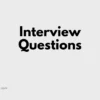Strategic Questions for Executive Interviews
Your interview questions for executive candidates should lead the candidate into a discussion that reveals more about the person, leadership abilities, and cultural fit. We took advice from some of the executive candidates we’ve placed through the years to develop a list of questions a prospective employer SHOULD be asking.
- Have you thought about leaving your present position before? If yes, what held you back? What you’ll learn: Values and how motivated your candidate is to find a new opportunity.
- Think back to the best partner or supervisor you’ve ever worked with: What did you like about the person’s management style? What you’ll learn: The leadership skills your candidate strives for.
- Describe a time when your supervisor criticized your work. What you’ll learn: Reactions to perceived missteps and/or failures.
- What’s the most interesting thing about you that isn’t on your resume? What you’ll learn: Personal values and other interests.
- 10 commonly asked executive interview questions:
- What is the greatest accomplishment of your career? This is a classic interview question and one you should absolutely be prepared to answer. It is also a great opportunity to practice the art of the humble brag. Describe a great challenge you overcame, how your work helped your company achieve a milestone record, or a personal goal that you set for yourself and surpassed.
- If you could change anything in your past, what would that be? Interviewers ask this question to get an idea about your attitude and your character. Be honest with your answer but put a positive spin on it. Talk about what you learned from a mistake, how it changed you for the better, and how you’ve been able to help others from repeating the same mistake.
- What skills are you lacking? Tread lightly here. You don’t want to highlight any areas that would be a red flag on your ability to perform this job well. Describe areas where your skills are not as strong and then describe how you’re working to strengthen them.
- What do you dislike about your current job? This is not an opportunity to bash your current company, talk about how much of a monster your boss is, or whine that you’re overqualified for your current position but they just won’t promote you. Whatever your job is lacking should be something that this job will fulfill, as well as something that you can help the company with.
- What will your team learn from you? Highlight your best leadership qualities and the value your experience and knowledge will bring to a team. Give examples of how your coaching abilities have helped employees improve their skills in previous jobs.
Additionally, here are 10 good strategic-thinking interview questions:
- How much time per week or month do you invest in strategic planning?
- How do you inform your team and other departments within your company about your strategic decisions?
- Describe a time when you proactively identified and addressed an issue at your company.
Strategic thinking interview questions include:
- How do you define strategic thinking?
- Can you tell me about a time when you were able to anticipate and prepare for risks during a project?
- How do you research and analyze information when creating a strategy?
- How do you respond to decision-making while under pressure?
Moreover, for executive interview questions for strategic insight:
- Describe the most difficult professional decision you’ve ever had to make.
- Describe a time when you had to navigate a significant change within your organization.
- How do you balance short-term pressures with long-term strategic goals?
Essential Leadership Questions to Ask Executives
We took advice from some of the executive candidates we’ve placed through the years to develop a list of questions a prospective employer SHOULD be asking. This is important because the resume and references give you insight into job qualifications and career history. However, you also need to know what type of leader you’re getting, too. Below are their 20 favorite interview questions and what each question reveals about an executive candidate.
- What makes you effective? What you’ll learn: Work style and whether it complements your company’s culture.
- Describe the biggest change you’ve ever dealt with. How did you adapt? What you’ll learn: Whether they have the experience to take on a stressful role.
- Think back to the best partner or supervisor you’ve ever worked with: what did you like about the person’s management style? What you’ll learn: The leadership skills your candidate strives for.
- In what areas would you like to further develop yourself? What you’ll learn: Potential for growth within your organization.
- How do you keep your team focused? What you’ll learn: Motivational and leadership personality.
- How do you influence and sell coworkers? What you’ll learn: Ability to manage and/or influence laterally.
- What is the greatest accomplishment of your career? This is a classic interview question and one you should absolutely be prepared to answer. It is also a great opportunity to practice the art of the humble brag. Describe a great challenge you overcame, how your work helped your company achieve a milestone record or a personal goal that you set for yourself and surpassed. Don’t be arrogant or smug (here’s where the ‘humble’ part comes in) but describe how your hard work helped to make a positive difference for your company or coworkers.
- What skills are you lacking? Tread lightly here. You don’t want to highlight any areas that would be a red flag on your ability to perform this job well. Describe areas where your skills are not as strong and then describe how you’re working to strengthen them.
- Tell me about a time when you clashed with your supervisor. This question shows the interviewer your problem-solving skills and how you handle disagreements with superiors. Be mature in your response and make sure the story ends on a positive note. Describe how you worked through the situation, while remaining professional and productive.
- What is your leadership style? How do you motivate your team? How do you handle team disagreements? What is your preferred company culture? How do you encourage employee development? Talk about your team leader qualities. What is your greatest professional achievement? Where can our company improve? How do you delegate tasks?
- When answering a leadership style question in an interview, it’s essential to be honest and provide concrete examples that demonstrate your approach. Start by describing your overall philosophy and then provide specific instances where you applied your leadership style effectively, highlighting the results achieved.
- Here are some good questions to ask a CEO in regards to their leadership:
- What are your thoughts on leadership?
- What makes a good leader?
- What do you think are the most important qualities for a leader?
- What do you think are the biggest challenges faced by leaders today?
- How do you develop and motivate your team?
- Leadership interview questions tend to inquire about your experience working with a team, resolving conflicts, communicating with others, and motivating people.
Insightful Questions for Senior Management Interviews
These top 6 senior management interview questions are suitable for these senior level roles: Senior Leaders, Senior Managers / Management, Senior Executive, Senior Leaders / Leadership Roles.
Top 6 Types Of Interview Questions For Senior Managers & Directors:
- Classic – What are you passionate about? Where do you see yourself in five years? Tell me about yourself.
- Brainteaser – How heavy is the Statue of Liberty? How many hotel shampoo bottles are used every day?
- Decision Making – Can you tell me about a time when you had to make an unpopular decision?
- Situational – What was your greatest success in your last company?
- Personality – What are your hobbies?
- Research – What do you know about our company?
As a knowledgeable career coaching consultancy, we’ve identified the 6 most common types of interview questions for senior managers, senior executives, and senior leadership roles alike.
It is imperative that you prepare for your senior management interview. Enter the senior level interview with a solid knowledge of the company’s history, a clear understanding of the business model, and an idea of how you would approach your daily duties if you got the job.
Let’s divide all the questions to ask executives at your company into the following logical groups:
- Questions about employee engagement
- Questions about strategy and performance
- Questions about company success vision
- Questions about team culture
- Questions about the importance of employee well-being
- Questions about career growth and development
- Fun questions
Quality employee engagement is essential for the company’s growth. This is not only because an engaged employee is more motivated and devoted to a particular company, but also because such an employee is less likely to leave the company in the long run. According to Wellable, about 87% of employees are less likely to quit if they’re actively engaged in the workplace.
A person who occupies a leadership position should have a clear vision of what their company wants to achieve and be able to convey this vision to all employees to keep them motivated and effective. Additionally, today’s leaders should know the approaches that help their organization achieve success.
Employees can gain valuable insights into the company culture by talking to colleagues from leadership positions. Furthermore, they can encourage leaders to improve it if there’s such a need. Among the questions to ask senior management are the following:
- What should be done to keep every team motivated in your mind?
Career development possibilities are essential for all team members to stay motivated. This reduces the desire to find better work conditions and opportunities at another company. Employees who have access to professional development opportunities are 15% more engaged in company operations.
Some additional questions to consider include:
- What is your management style?
- How would you describe our company?
- What is your leadership philosophy?
- Why do you want this position?
- Why is vision so important?
- What can employees learn from you?
- What makes you effective?
- Where could you improve?
- Why should we hire you?
Moreover, it is important to ask:
- What are your thoughts on leadership?
- What makes a good leader?
- What do you think are the most important qualities for a leader?
- What do you think are the biggest challenges faced by leaders today?
- How do you develop and motivate your team?
Further, relevant inquiries could include:
- What does success in the role look like?
- What’s my boss’s (or board’s) expectations for me?
- What are the strengths and weaknesses of the organization as it currently exists?
- What’s the degree of managerial discretion in the role?
- What’s the history of the role?
Additionally, consider questions regarding metrics and future goals:
- What metrics do you use to measure success in your role?
- How do you approach continuous improvement within your organization?
- What are your top priorities for the next year?
- How do you envision the organization evolving over the next five years?
- What legacy do you hope to leave as a leader?
Finally, it’s valuable to understand the leader’s perspective on organizational performance:
- How do you evaluate the current company’s performance?
- What is your vision for our company?
- Describe the biggest organizational change you’ve ever dealt with.
Challenging Interview Questions for Executives
Challenging Interview Questions for Executives:
- What was the biggest mistake you have made in the past year?
- What is your greatest weakness as an executive?
- Tell me a time you had to turn down one of your employees for a promotion.
- Tell me about a time you had to fire one of your employees.
- What would your employees say about you as a leader?
- Can you describe a situation where you …?
- How have you balanced the need for immediate …?
- How do you approach risk management at the …?
- Can you share an instance where your decision had …?




